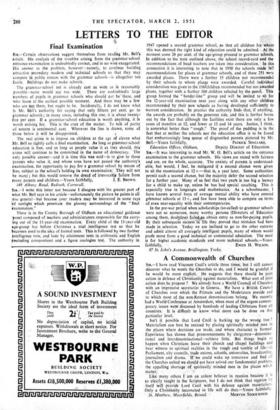LETTERS TO THE EDITOR
Final Examination
SIR.—Ccrtain observations suggest themselves from reading Mr. Bell's article. His analysis of the troubles arising from the grammar-school entrance examination is undoubtedly correct, and in no wise exaggerated. His answer to the problem, however—namely, to continue building attractive secondary modern and technical schools so that they may compete in public esteem with the grammar schools—is altogether too facile. Buildings do not make schools.
The grammar-school net is already cast as wide as is reasonably possible—some would say too wide. There are undoubtedly large numbers of pupils in grammar schools who should not be' there, and who leave at the earliest possible moment. And there may be a few who are not there, but ought to be. Incidentally, I do not know what is Mr. Bell's authority for saying that only fifteen per cent. go to grammar schools ; in many areas, including this one, it is about twenty- five per cent. If a grammar-school education is worth anything, it is worth striving for. This is the crux of the matter. To talk of parity of esteem is sentimental cant. Wherever the line is drawn, some of those below it will be 'disappointed. -
The real crime is to impose on children at the age of eleven what Mr. Bell so rightly calls a final examination. As long as grammar-school education is free, and as long as people value it as they should, this crime will continue to be committed in the name of democracy. The only possible answer—and it is time this was said—is to give to those parents who value it, and whose sons have not passed the authority's examination, the opportunity to pay for a grammar school by means of fees, subject to the school's holding its own examination; They will not be many ; but this would remove the dread of irrevocable failure from many parents and children.—Yours faithfully, ). E. BROWN. 148 Albany Road, Redruth, Cornwall.
write this letter not because I disagree with the greater part of what Mr. Bell says in his article—unfortunately the picture he paints is all iloo general—but because your readers may be interested in some rays lof sunlight which penetrate the gloomy surroundings of the " final examination?'
There is in the County Borough of Oldham an educational guidance 'panel composed of teachers and administrators responsible for the carry- ing out of the 11-year-old examination. Every child of the 11-year-old age-group has before Christmas a trial intelligence test so that he becomes used to the idea of formal tests. This is followed by two further intelligence tests, and later by attainment tests in arithmetic and English (including composition). and a figure analogies test. The authority in 1947 opened a second grammar school, so that all children for whom this was deemed the right kind of education could be admitted. At the moment some 20 per cent. of the age-group proceed to grammar schools. In addition to the tests outlined above, the school record-card and the recommendations of head teachers arc taken into consideration. In this connection it is interesting to note that in 1950 the schools made 367 recommendations for places at grammar schools, and of these 251 we-c awarded places. There were a further 15 children not recommended by their schools to whom place,s were awarded. Careful individual consideration was given to the 1161children recommended but not awarded places, together with a further 100 children selected by the panel. This group formed the " border-line" group and will be invited to sit for the 12-year-old examination next year along with any other children recommended by their new schools as having developed sufficiently to warrant consideration. In practio: the authority finds that, if anything,
the awards are probably on the generous side, and this is further borne out by the fact that although the facilities exist there are only a few cases of transfers at 12, and fewer at 13 and 14 years. Justice, I think, is somewhat better than " rough." The proof of the pudding is in the fact that at neither the schools nor the education office is to be found that embarrassingly long queue of disgruntled parents pictured by Mr. Bell.—Yours faithfully, PATRICK SHALLARD, Education Offices, Oldham. Deputy Director of Education. Sut,—It was interesting to read Mr. W. 0. Bell's article on the entrance examination to the grammar schools. His views are stated with fairness and are, on the whole, accurate. The anxiety of parents is understand- able, but would, I feel, be mitigated if a second chance were given to sit the examination at 12+— that is, a year later. Some authorities permit such a second chance, but the majority defer the second selection for a further year. Many of us feel that two years is too big a leeway for a child to make up, unless he has had special coaching. This is especially true in languages and mathematics. As a schoolmaster, I have known several boys of average mental ability who have entered grtmmar schools at 13+, and few have been able to compete on terms of even near-equality with their contemporaries.
In the pre-war period when scholarships (so-called) to grammar schools were not so numerous, many worthy persons (Directors of Education among them, doubtless) faileddito obtain entry as non-fee-paying pupils. By their subsequent success '1'n life they proved that mistakes had been made in selection. Today we are inclined to go to the other extreme and admit almost all averagely intelligent pupils, many of whom would profit more from a good technical or commercial education. The need is for higher academic standards and more technical schools.—Yours faithfully, EWEN H. WILSON. 87 St. John's Avenue, Bridlington, Yorks.


































 Previous page
Previous page